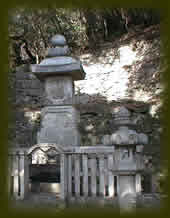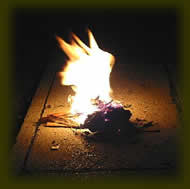
Ohaka (family tomb)

Mukaebi
(welcoming fire)
O-Bon is the Japanese festival for commemorating the deceased, during the course of which the souls of the dead are guided home, feted for several days, and then sent back to the spirit world.
The word O-Bon has its roots in the Sanskrit word ullambana, which means ‘deliverance from suffering’. The festival combines early Buddhist rituals designed to rescue the souls of the dead from hell, with native Japanese agricultural rites and the Shinto† tradition of welcoming back the souls of ancestors in late summer.
Traditionally, the bones of the deceased are placed in individual urns and kept with their ancestors in a family tomb (ohaka). For several consecutive evenings during the week of O-Bon, paper lanterns painted with the family crest are hung to guide the ancestral spirits to the ohaka; alternatively, small welcoming fires (mukaebi) may be lit at the entrance to the home. It is also customary at this time to clean the family grave and present fresh flowers and incense; those who are unable to travel to their family burial place may instead spruce up the domestic altar.
Although
many Japanese also hold Shinto beliefs, it is Buddhism that is associated
with rituals concerned with death. Therefore it is the Buddhist household
altar—the butsudan—that remains the focus of attention
during O-Bon. Offering
stands and a small tray with tiny dishes for the symbolic meals offered
to the ancestors are brought out, and a special shelf is set up in front
of the altar; it is here that, for the duration of O-Bon, the spirits
are believed to dwell.
†Shinto
is Japan’s indigenous religion. The two Chinese characters used
to write the word Shinto are shin (or kami),
which means gods or divinity, and dô/tô (or michi),
which means way or road, and the term is thus often translated as “the
way of the gods.” The use of the word Shinto dates to around
the 6th century CE; Buddhism was being introduced into Japan around this
time, and and it was clearly deemed necessary to differentiate the native
beliefs and practices from Buddhism.